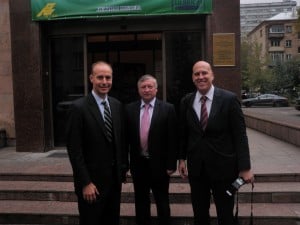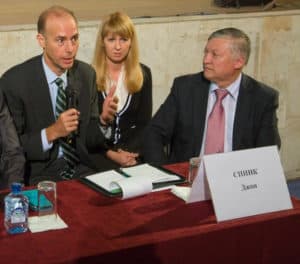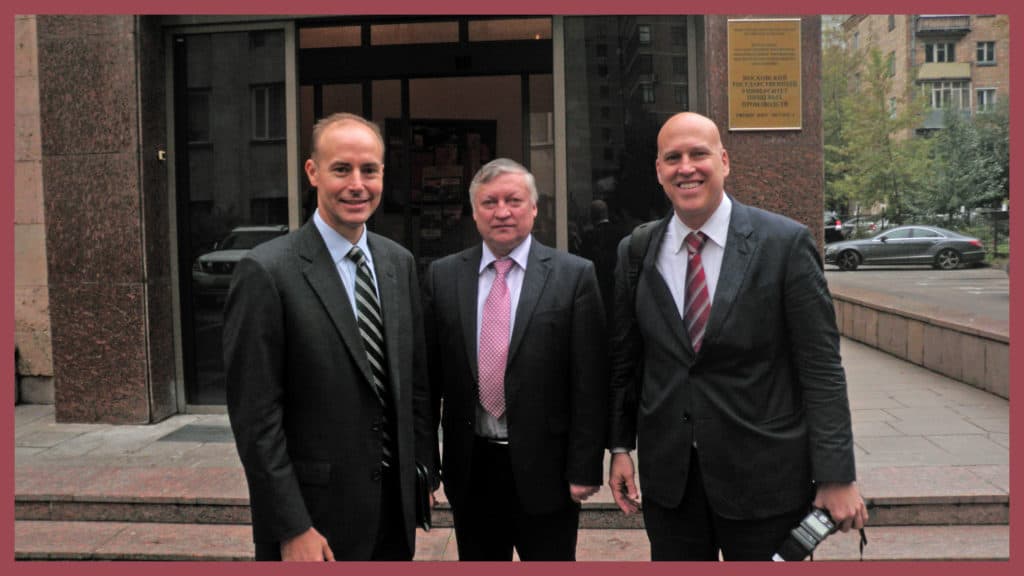There is probably no better partner for our Food Fraud research than our Moscow State University for Food Production (MSUFP) colleagues. We engaged as scientists and worked together as friends. We are now collaborating on projects from a common perspective. We will build a firm foundation of education and harmonization to advance Food Fraud prevention. Reflecting on the trip, I’m very encouraged by the growing working relationship between the US and Russia – including expanding to our mutual Korea colleagues.

I just returned from an incredible week in Russia at MSUFP. This partnership came about from a chance encounter while the University President (Dmitry Edelev) and Vice-Rector (Victor Fersht) were presenting at a conference in China last June. We immediately found that we had many similar research interests in food protection and food counterfeiting/ food fraud. We met also with another Vice-Rector (Natalia Mayorova) the next day at the Global Food Safety Initiative meeting. Our discussions continued and they invited me to their Food Safety Problems conference this last week in Moscow.
I am especially grateful to the Fulbright Foundation, the US Embassy Russia, and the International Institute for Education, which were the sponsors of last week’s conference. An unexpected additional link was with our colleagues in Korea, as their representatives, who are connected with my research colleague from Yong In University, Dr. Hyeonho Park, were also in attendance. Participating in the conference was an excellent way for MSUFP and our food fraud prevention research team to demonstrate international collaboration in action.
The opening ceremony of the conference is available at this link – my comments at 6:50 to 9:30 are in English, with a translator for the Russian audience. For any of you chess players, world champion Anatoly Karpov – and now member of the Russian Duma/ Parliament – is the keynote speaker at the end of the clip. He is a leader at MSUFP, and on what we could call our Board of Trustees. He is the chair of a Duma Committee that covers issues including Food Fraud prevention.

The key points I presented were:
- Defining Food Fraud: There is a foundation of ideas that define the threat, aspects of the incidents, and the crime science theories of Situational Crime Prevention.
- A Public Health Focus: The focus on improved public health, not just catching “bad guys,” was well received. We must continue to shift the focus to public health first.
- Prevention is Efficient: I emphasized the efficiency (time and money) of focusing on prevention. For product fraud and related areas the “bad guys” are so sneaky that herculean efforts are often required to even just find where they are hiding.
- Translate and Interpret: Defining the critical need to collaborate on terminology. That is, to go beyond the word (e.g. “adulteration”) to expand the definitions, and to then not only translate the word but to also interpret the meaning. We really need to study if there is a more effective word to use in other languages, such as Russian or Korean. This is a project that has already started and is based on the paper that I published in their conference proceedings publication.
- Exchange of Students and Scholars: I can’t even begin to explain how important it was for me to stay this long and spend so much time – professionally and personally – with my colleagues. Students and scholars need to spend time with each other and in the other’s environments. I had a great translator in Marina Kosycheva, who really helped me with the interpretation of both their words and mine. I can imagine how the science of Food Fraud prevention will advance when we bring more of our students together. In addition, we realized that we had a very engaged and capable set of prospective researchers in the Fulbright scholars who attended the conference.
The rich experiences and insights of this trip are too many to list. We had already started collaborating, and this conference allowed us to create even more impactful projects. We will continue our discussions next month in Dublin, where I’ll be presenting with my Russian colleagues at Interpol’s 2013 International Law Enforcement IP Crime Conference . Stay tuned here for more insight on our expanding partnership.

